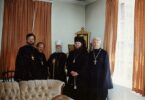Mitred Archpriest Aleksei (Ohotin) passed away on this in 2013.
Fr. Aleksei was born in 1933 in Yugoslavia. During his formative years, mitred Archpriest Aleksei Ohotin (Dean of the first deanery of the Eastern American Diocese, rector of the Annunciation Church in Flushing, and spiritual father for the National Organization of Russian Scouts) set his sights on the examples of self-renunciation presented by Archbishops Vitaly (Maximenko) and Nikon (Rklitsky). Serving the first and the second generation of the flock of the Russian Orthodox Church Abroad, Fr. Aleksei shared their daily hardships; he worked as a draftsman, a cab driver and in many other capacities in order to feed his family. On January 18, 2013, Fr. Aleksei stepped from his labors into the eternal life. May his memory be eternal! Below are excerpts from my interview with Fr. Aleksei.
A link to the entire interview can be found under the “Sources” section.
About Jordanville
In 1949, on the feast day of the Protection, we left Bremen. Ships were already carrying refugees. We left on October 14 and arrived on October 25. Thank God, we made it safely, because there was a hurricane then. We arrived in Connecticut. There were eight of us: my father and other, two sisters and three little nieces. We lived there until 1950, then we moved to Sea Cliff and settled there.
I first went to the St Vladimir’s “Gorka” celebration [Annual festival on the last weekend of July at St. Vladimir’s Memorial Church in Jackson, NJ]. This was in 1951, when I was 18 years old, and from there I went to Jordanville with Fr Kiprian and Fr Averky, and in general I had the desire to follow the spiritual life. I really liked Jordanville, but we had a disagreement at home: There were two jurisdictions then, ours and the American Metropolia. My elder sister’s husband was a teacher in St Tikhon’s Seminary in Pennsylvania, and he was an eminent figure there (Vladislav Maevsky). He said to me “Alyosha, come here to St Tikhon’s.” Jordanville was in the north, he said, it was cold and stormy. There was one monk there (later Archbishop Alypy), who had a bad cough and they decided that he had tuberculosis. They said “You will get sick, too, and they have no food.” But that’s where I wanted to go, and that was that.
I was still in high school then. Later, visiting St Tikhon’s, I saw a monk walk out of the kitchen and light a cigarette. And they said “Today we’re having meat kotleti.” The church didn’t have many people at service. It just wasn’t my cup of tea. I went home and said that I am going to Jordanville, no matter what!
I moved to Jordanville in 1953, in time for the feast of the Protection of the Mother of God, when the seminary school year began. That year a Council of Bishops convened. All the bishops gathered there to see how the establishment of the monastery was progressing. Fr Panteleimon was already working there in the fifties, and Fr Joseph was the choir director. After the war ended, the monks from Pochaev Monastery [in Ladomirova] moved to Jordanville. Fr Panteleimon was very lucky to get the new workers.
Did the priestly duties come quickly for you?
Yes, pretty quickly, although I had a difficult life, because even in Poughkeepsie I had to work. One person got me a job at IBM, but he was also the reason I asked to be released from the parish. The problem was that he was a Freemason, and tried to persuade me to join, that I had to be a member, otherwise I would lose my house, my job, etc. That very evening I called Vladyka Nikon, who was our Vicar. He said that a position at a parish in Jackson Heights, NY, was opening, and I would be transferred there. This was a parish of intellectuals: a commander of the personal convoy of His Imperial Majesty, he was a member of the closest security detail of the Tsar. There were counts, princes, generals. This was closer to my heart, and I felt at home there, where I was to spend nine years. By the time I left, there were only six people left.
I didn’t maintain too many contacts, because I was a working priest. I worked five days a week, and Saturday and Sunday I served all-night vigil and Liturgy, then back to work the next day.
Two or three times I went to a clergy conference for a day, that was all I could afford to do. I couldn’t get time off work. Other priests had different lives; their matushkas would work while they tended to church life. But I felt sorry for my wife—I know from working how you have to endure pranks and difficult interrelationships and quarrels in the workplace, and I didn’t want to subject her to that. Vladyka gave me a blessing to have a job, and so unfortunately I didn’t have much time to socialize with other clergymen.
How can a priest manage with a civil job?
You use oikonomia. I was once a cab driver. Once I smelled something like burning hay, and when I dropped off the fare, I realized what they were smoking. Once I had to drive a drunk man, because cab drivers don’t have the right to refuse a fare for any reason, so I let him in the cab. Once a fare sat down in the front, next to me, not in the back. I began to pray, sensing that something was not right. He suddenly said “Stop!” He threw money at me and ran away; it seemed that he saw some cops. I had been praying to St Nicholas while driving, and I think he saved me.
I was a cab driver, but I also installed fire safety systems, I helped build the Lunar Explorer Module, for which I got an award. I had to adapt to working during holidays. I would serve all-night vigil, at least, if I couldn’t get the day off; that would happen sometimes. I had no other choice.
Source:
“I am Going to Jordanville, No Matter What!” Historical Studies of the Russian Church Abroad.












Mitred Archpriest Aleksei served the Association of Russian Explorers Outside of Russia, Inc. or better known as Camp NORR from 1972 to his repose. His unwavering support of young Orthodox children over the years impacted many upcoming clergy and Matushkas. He did all this while serving his own parish traveling back and forth from Flushing NY to Woodbourne NY 2 hours or more away. Eternal Memory!